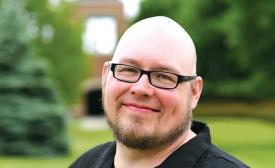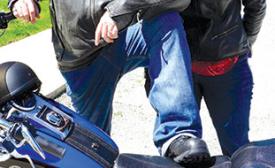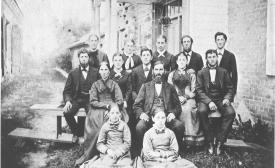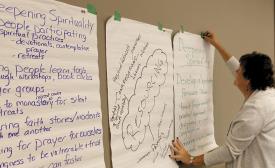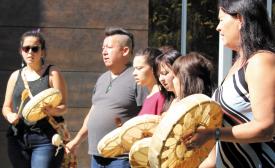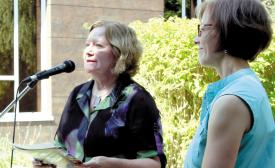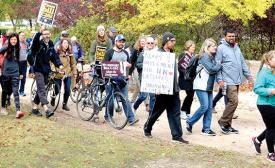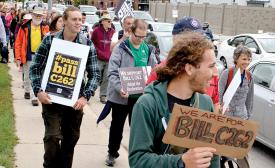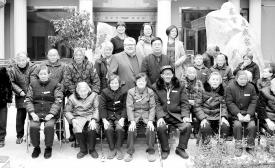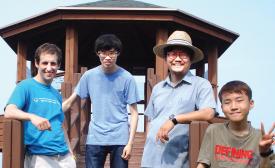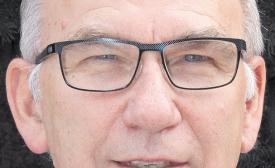Volume 21, Number 19
Nurturing a shared identity
In the Future Directions conversations, many people expressed a lingering concern that the proposed regional network forming Mennonite Church Canada could cause us, as a church family, to lose a nationwide sense of shared mission and identity. The fear is that each region will be preoccupied with its own local agenda and, therefore, will pull back from connecting with the broader church.
Prodigal pastor
Seventy-four-year-old George Ediger rushed out of church during the final song and caught up with the newcomer in the parking lot before the big young visitor with the shaved head and biker beard could escape in the maroon hot rod that stood out among the grey and beige sedans.
Readers write: October 9, 2017 issue
Kudos to ‘Shared land’ organizers and participants
Re: “Shared land” photo, Aug. 28, back cover.
My husband and I attended and appreciated the focus on learning about and respecting the thousands of years of history of our land. It was a profound and honest way to celebrate Canada’s 150 birthday.
The gift of sabbatical
I didn’t share the Bridge Diagram with her
She sat on the sidewalk of the busy street corner, five months pregnant and without a place to call home. We sat there with her on the cold concrete, listening to her story of unwarranted eviction and the seizure of all her possessions. She didn’t know how it would work out, but she expressed certainty that she’d have a place to live by the time the baby arrived.
Jacob Shantz
Jacob Y. Shantz (1822-1909) of Berlin, Ont., (now Kitchener), with his family. Shantz was involved in fruit growing and maple-sugar production. He was a building contractor and industrialist, but is also remembered for his role in the establishment of Mennonite communities in Manitoba. The Manitoba village of Shantzenfeld is named in his honour.
Harvesting ideas for a new Mennonite Church Saskatchewan

Craig Neufeld, standing, and Bruce Jantzen brainstorm ways of making the dream of ‘deeper spirituality’ a reality at MC Saskatchewan’s Refresh, Refocus, Renew mini-retreat. (Photo by Donna Schulz)

Valerie Wiebe and Carrol Epp listen as Char Bueckert, right, shares her ideas for implementing the three themes that emerged during MC Saskatchewan’s Refresh, Refocus, Renew mini-retreat. (Photo by Donna Schulz)
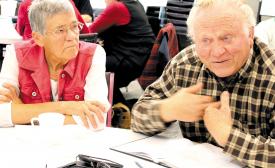
Marg Peters listens as Berny Wiens shares his thoughts during MC Saskatchewan’s second Refresh, Refocus, Renew mini-retreat. (Photo by Donna Schulz)
It’s harvest time on the Prairies for farmers on their combines, and this year for members of Mennonite Church Saskatchewan as they met for their second Refresh, Refocus, Renew mini-retreat.
Saskatchewan congregation adopts new English name
Hoffnungsfelder Mennonite Church has a new name. Now known as Fields of Hope Mennonite Church, the congregation once met in three neighbouring communities: Glenbush, Rabbit Lake and Mayfair, Sask., about 195 kilometres north of Saskatoon. Today, although the three churches still exist as legal entities, services are primarily held at the Glenbush church.
On a journey towards reconciliation

The new sign at Conrad Grebel University College, unveiled on Sept. 22, acknowledges the history of the land in relationship to Indigenous peoples. (Photo by Dave Rogalsky)
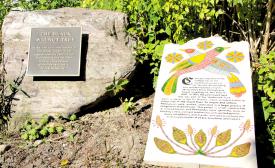
The old and new signs at Conrad Grebel University College. The new sign, unveiled on Sept. 22, acknowledges the history of the land in relationship to Indigenous peoples. (Photo by Dave Rogalsky)
Twelve years ago, Conrad Grebel University College planted a black walnut tree and erected a sign marking the 200th anniversary of the arrival in 1805 of the first Mennonite settlers from Pennsylvania and the establishment of the “German Company Tract.” But time has a way of altering understandings of events and history. On Sept.
‘For Christ’s sake, we better do something about it’
“Walk the talk of nation to nation. Implement the declaration!”
More than a hundred people chanted these words as they walked for Indigenous rights in Winnipeg, situated on Treaty 1 land, on Sept. 23, 2017.
Faces and places in an aging China
Like Canada, China is facing an aging population. There is a growing need for elder-care homes, as families shift away from the cultural norm of taking care of their aging loved ones. Churches have stepped in and have begun to build elder-care homes to address the need.
PACS grads create a strong society
At Conrad Grebel University College, parents of prospective peace and conflict studies (PACS) students often ask, “What kind of job will my child get after graduation?” What we say with confidence is that an undergraduate or graduate PACS degree equips students with highly sought-after skills in today’s job market.
A passionate advocate for Mennonite education
Mennonite institutions endure based on the hard work and dedication of those who believe in their impact on individuals and the broader community. On Jan. 31, 2018, Rockway Mennonite Collegiate will lose a passionate advocate for Mennonite education, one the school will sorely miss, when Dennis Wikerd retires as the school’s assistant principal after 39 years of service.
Canadian MBA students explore the common good
Ten graduate students, including five Canadian Mennonite University students, gathered on the campus of Bluffton University for a week in August for the fourth annual Collaborative MBA (master of business administration) residency. While the students began as strangers from vastly different backgrounds, they left with newfound ideas on leadership and lasting bonds.
Learning to be vulnerable
I graduated from Mennonite Collegiate Institute (MCI) in Gretna, Man., in 2016, and it is where I first learned to be vulnerable.
Serving students and learning from mistakes
In addition to faculty and staff, student council members can play a key role in shaping campus life at colleges and universities. By advocating for their peers, planning social events and organizing service projects, these young leaders have a big impact on what goes on between and after classes.
The kids are all right ... aren’t they?
Gil Dueck doesn’t have a one-size-fits-all plan for how churches can better engage with the young adults in their congregations, but he has some ideas.
While questions about “how the kids are doing” can quickly become cliché, he says, ultimately, they are healthy.


